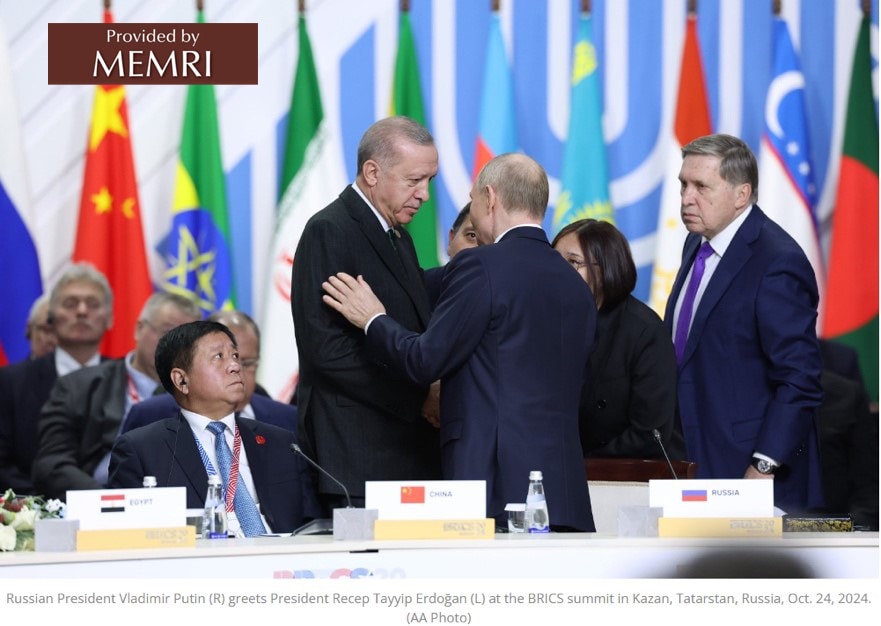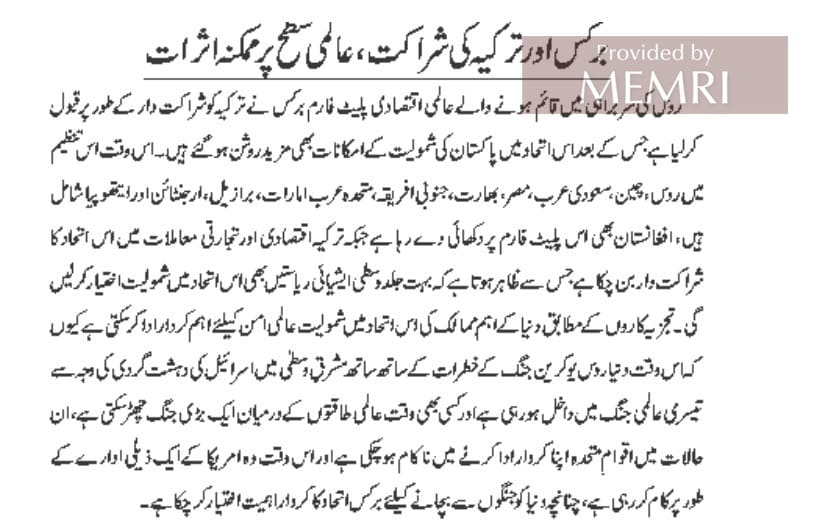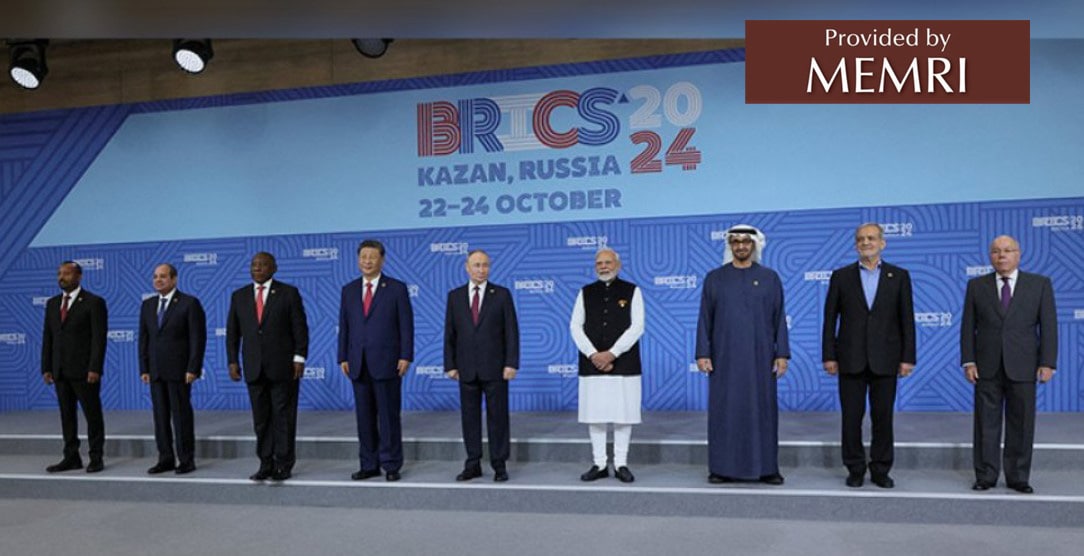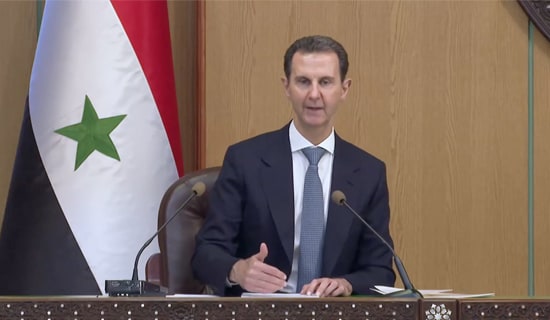Russian President Vladimir Putin hosted the 16th BRICS Summit on October 22-24, 2024, in Kazan, in the Tatarstan republic of Russia, with new members Iran, the United Arab Emirates, Egypt, and Ethiopia participating for the first time. At the summit, Vladimir Putin also welcomed President Recep Tayyip Erdoğan of Turkey, which is the first NATO member state to seek to join BRICS, the trading bloc of emerging economies'.[1]
"The political and financial mechanisms that emerged after World War II cannot deliver what is expected of them," President Erdoğan told delegates at the summit, adding: "We are determined to further our dialogue with the BRICS family, with whom we have developed close relations based on mutual respect and win-win [agreements]."[2] A media report noted the consequence of Turkey's possible admission into BRICS: "If admitted, it would be the first NATO member to join the alliance, which sees itself as a counterweight to Western powers and whose members are sharply at odds the West over several issues, notably the ongoing Mideast conflict."[3]

At the Kazan summit, the BRICS member countries accorded the status of "partner states" – a step closer to membership – to the following countries: Turkey, Indonesia, Algeria, Belarus, Cuba, Bolivia, Malaysia, Uzbekistan, Kazakhstan, Thailand, Vietnam, Nigeria, and Uganda.
Along with Turkey, Pakistan, the only Islamic nuclear-armed state in the world, has also sought BRICS membership. But, at the recent BRICS summit, India pushed against granting Pakistan membership. "Since BRICS operates on a consensus basis for admitting new members, India's stance could effectively block Pakistan's entry into the bloc, despite the support of some founding nations like Russia and China," an Indian media report noted.[4]
Despite India's efforts to bloc Pakistan's entry into BRICS, Islamist forces, such as the pro-Taliban Urdu daily Roznama Islam, are hopeful that Turkey and Pakistan, as well as Iran, which is already a member of the trading bloc, can play an important role in undercutting American dominance in the world affairs, as argued in the editorial below.
Following is the text of the editorial, as translated from Urdu:[5]
"The Presence Of The BRICS Alliance Is Basically A Collective Effort By The Asian And Non-White Nations To Get Rid Of The U.S. And Europe's Racial Alliance"
"BRICS and Turkey's Partnership: The Possible Effects On The Global Level
"The international emerging economies' platform, BRICS, established under the leadership of Russia, has accepted Turkey as a partner, brightening Pakistan's chances of joining the bloc. Currently, Russia, China, Saudi Arabia, Egypt, India, South Africa, the United Arab Emirates, Brazil, Argentine, and Ethiopia are members of this organization.
"Afghanistan can also be seen on this platform while Turkey has become a partner of this alliance on the economic and trade issues, indicating that the central Asian states will soon join this alliance.
"According to analysts, the joining of this alliance by the world's important countries can play a key role for the global peace because the world is entering the Third World War with the perils of Russia-Ukraine war along with the Israeli terrorism in the Middle East and a massive war can erupt between the global powers anytime.
"In this situation, the United Nations has failed to play its due role and has been working as a U.S.-run organization. Therefore, the BRICS alliance has gained importance to protect the world from wars. The presence of the BRICS alliance is basically a collective effort by the Asian and non-white nations to get rid of the U.S. and Europe's racial alliance i.e., the West's economic monopoly and political dominance.
"Russian President [Vladimir] Putin has said that with efforts of the BRICS, new cities will soon be established and the life standard there will grow similar to the people of Europe. Putin's statement shows that the platform comprising of the BRICS countries, instead of moving forward on the basis of wars, is trying to move forward through investment, trade partnership, and regional interaction."
"Putin's Recent Remarks About The West's Economic Clutches Are Based On Truth Because The United States Is Using The Dollar As A Weapon Of War To Punish Its Opponent Countries"
"However, it is evident to any discerning person that the success of this alliance hinges on its ability to counter the military power, capabilities, political strategies, and diplomatic conspiracies of the U.S. and Europe.
"On this basis, the economic partnership among the countries in this alliance on the international level can become a challenge for the economic dominance of the U.S. And trade, economic, industrial, agricultural, and activities comprising of human resources will achieve success, ushering in the prosperity in the lives of the general public of these regions and getting rid of the West's dominance.

A screenshot of the Roznama Islam editorial
"Putin's recent remarks about the West's economic clutches are based on truth because the U.S. is using dollar as a weapon of war to punish its opponent countries. Keeping in view the monopoly of the dollars and its use as a war tactics, the plan for the issuance of a new currency from the BRICS platform has been presented.
"Only the economists can tell better as to what the possibility of popularity of a new currency in future can be and at a time when the West seems to be in support of the virtual currency, and what economic benefits BRICS countries can achieve through its new currency."
"Russia Would Want The U.S. To Engage In Prolonged Wars So That Its Popularity In The World Can Decline Further"; "Despite Being A NATO Member, Turkey Has Become A Partner Of BRICS, And This Act Has Created Enough Of A Chance For Pakistan To Be On This Platform"
"However, according to the analysts of international war affairs, Russia would want the U.S. to engage in prolonged wars so that its popularity in the world can decline further. It is quite clear that if the U.S. engages in the Iran-Israel war after the wars in Gaza and Ukraine, serious questions will be raised by the people of Europe on its foreign policy, its loosening grip will further weaken on the international issues.
"And the shifting of balance of power will intensify and the U.S. has to spend more budget to stop this process. It is clear that its effects will affect the American people who are currently in the legal clutches, increasing taxes, and severely feel declining employment opportunities.
"Despite being the NATO member, Turkey has become a partner of BRICS, and this act has created enough chance for Pakistan to be on this platform. In view of the recent SCO [Shanghai Cooperation Organization meeting in Islamabad, Pakistan, on October 15, 2024] conference and growing relations with Russia, Pakistan already seems close to this alliance.
"Due to its location on the confluence of Europe and Asia, Turkey is of an immensely important country on economic level besides enjoying good influence in the Muslim world. Similarly, Pakistan's importance in South Asia is also not less. The inclusion of these two countries will further strengthen the BRIC alliance."
"Though The United States Has Not Yet Suffered A Defeat And Is Still Present In A Part Of The Middle East As A Major Partner, Its Pro-Israeli Policies Are Pushing Them Toward Its End"
"Now, the white nations, especially the U.S., should realize that the U.S. cannot continue its policy of carrot and knife with the countries of the world. By supporting Israel, the U.S. has upset a big part of the Muslim Ummah.
"Currently, Israel poses a significant threat to the Arab countries, with its leadership openly expressing nefarious intentions. In this situation, the Arab states cannot afford to rely blindly on the U.S. for long.

Leaders of BRICS member countries at the Kazan summit, October 22-24, 2024.
"The inclusion of Saudi Arabia and the United Arab Emirate shows that the sun of the American monopoly in the Middle East is setting. Though the U.S. has not yet suffered a defeat and is still present in a part of the Middle East as a major partner, its pro-Israeli policies are pushing them towards its end.
"On the international level, people have started realizing that instead of unnecessarily becoming part of globalization, economic cooperation and trade partnership with regional countries can prove more beneficial to them.
"Through this way, the threat of war will also subside to a large degree and the states, instead involving themselves in useless disputes, will agree to work jointly. Turkey and Pakistan joining the BRICS will also pave the way for other countries to become partners of this alliance."




